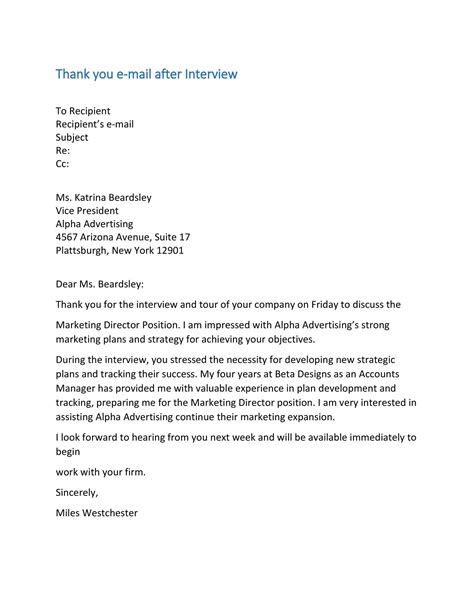Thank-You Emails After Interviews: Best Examples

After going through the grueling process of applying for a job, getting shortlisted, and facing the interviewers, it’s time to send a thank-you email. This follow-up email can help you stand out from the other candidates and leave a lasting impression on the interviewer. In this post, we’ll provide you with the best examples of thank-you emails after interviews, along with tips and tricks to make your email effective and professional.
Why Send a Thank-You Email?
Sending a thank-you email after an interview is not just a formality, it’s an opportunity to:
- Thank the interviewer for their time and consideration
- Reiterate your interest in the job and the company
- Highlight your qualifications and skills
- Address any concerns or questions that were raised during the interview
- Leave a lasting and positive impression on the interviewer
When to Send a Thank-You Email?
The best time to send a thank-you email is within 24 hours of the interview. This shows that you are prompt, professional, and interested in the job. However, if you forgot to send the email within 24 hours, it’s better late than never. A delayed thank-you email is still better than not sending one at all.
What to Include in a Thank-You Email?
Your thank-you email should be concise, professional, and customized for the job and the company. Here are the essential elements of a thank-you email:
- Greeting: Address the interviewer by name and thank them for their time
- Personalization: Mention something specific that was discussed during the interview to show that you were attentive and engaged
- Appreciation: Express your gratitude for the opportunity to interview for the job and learn more about the company
- Reiteration: Reiterate your interest in the job and the company. Explain why you are a good fit for the position and how you can contribute to the company’s goals
- Closing: Thank the interviewer again and express your willingness to answer any further questions or provide additional information
- Signature: Include your full name, contact information, and any relevant links or attachments
Best Examples of Thank-You Emails after Interviews
Example 1: Basic Thank-You Email
Dear [Interviewer’s Name],
Thank you for taking the time to interview me for the [Job Title] position at [Company Name]. I appreciate the opportunity to learn more about the company and the position.
I am excited about the possibility of joining your team and contributing my skills and experience to the company’s goals. Please let me know if you need any further information or have any questions for me.
Thank you again for your time and consideration.
Best regards,
[Your Name]
Example 2: Personalized Thank-You Email
Dear [Interviewer’s Name],
Thank you for the insightful interview for the [Job Title] position at [Company Name]. I enjoyed learning more about the company’s mission and the challenges and opportunities of the position.
I was particularly impressed by the company’s commitment to sustainability and innovation, which aligns with my own values and skills. I believe that my experience in [Skill 1] and [Skill 2], as well as my passion for [Industry/Field], make me a strong candidate for the position.
Thank you again for your time and consideration. I look forward to the opportunity to contribute to the company’s success.
Best regards,
[Your Name]
Tips and Tricks for Writing an Effective Thank-You Email
1. Be Prompt and Professional
Send the thank-you email within 24 hours of the interview, and use a professional tone and language. Make sure to proofread and edit the email for typos, grammar, and formatting.
2. Customize and Personalize the Email
Refer to specific topics, questions, or concerns that were raised during the interview. Show that you were paying attention and engaged in the conversation. Use the company’s name, mission, values, and culture to tailor your email to the job and the company.
3. Reiterate Your Interest and Qualifications
Remind the interviewer why you are a good fit for the job and the company. Emphasize your relevant skills, experience, and achievements, and how they can contribute to the company’s goals and success.
4. Follow Up with Additional Information
If you promised to provide additional information or answer any further questions, make sure to follow up on your promise. This shows that you are reliable, professional, and willing to go the extra mile.
5. Avoid Common Pitfalls
Avoid using a generic or robotic template for the thank-you email. Don’t repeat your resume or cover letter in the email, or exaggerate your qualifications or achievements. Don’t ask about the salary, benefits, or perks in the email, or send multiple follow-up emails or phone calls.
Conclusion
A thank-you email after an interview can help you leave a positive and lasting impression on the interviewer, and increase your chances of getting the job. Make sure to customize and personalize the email, reiterate your interest and qualifications, and follow up with additional information if necessary. Use the best examples and tips provided in this post to create an effective and professional thank-you email.
FAQs
Q1. Can I send a handwritten thank-you note instead of an email?
A1. Yes, you can send a handwritten thank-you note if you prefer. However, an email is more practical, prompt, and professional, especially if the hiring process is time-sensitive or conducted online.
Q2. Should I send a thank-you email even if I don’t want the job?
A2. Yes, you should still send a thank-you email to show your professionalism, gratitude, and respect for the interviewer’s time and effort. You never know when you might cross paths with the interviewer again, or when they might recommend you for a different job or company.
Q3. How long should my thank-you email be?
A3. Your thank-you email should be concise and to the point, ideally no longer than one page or one screen. However, make sure to include all the essential elements and personalize the email as much as possible.
